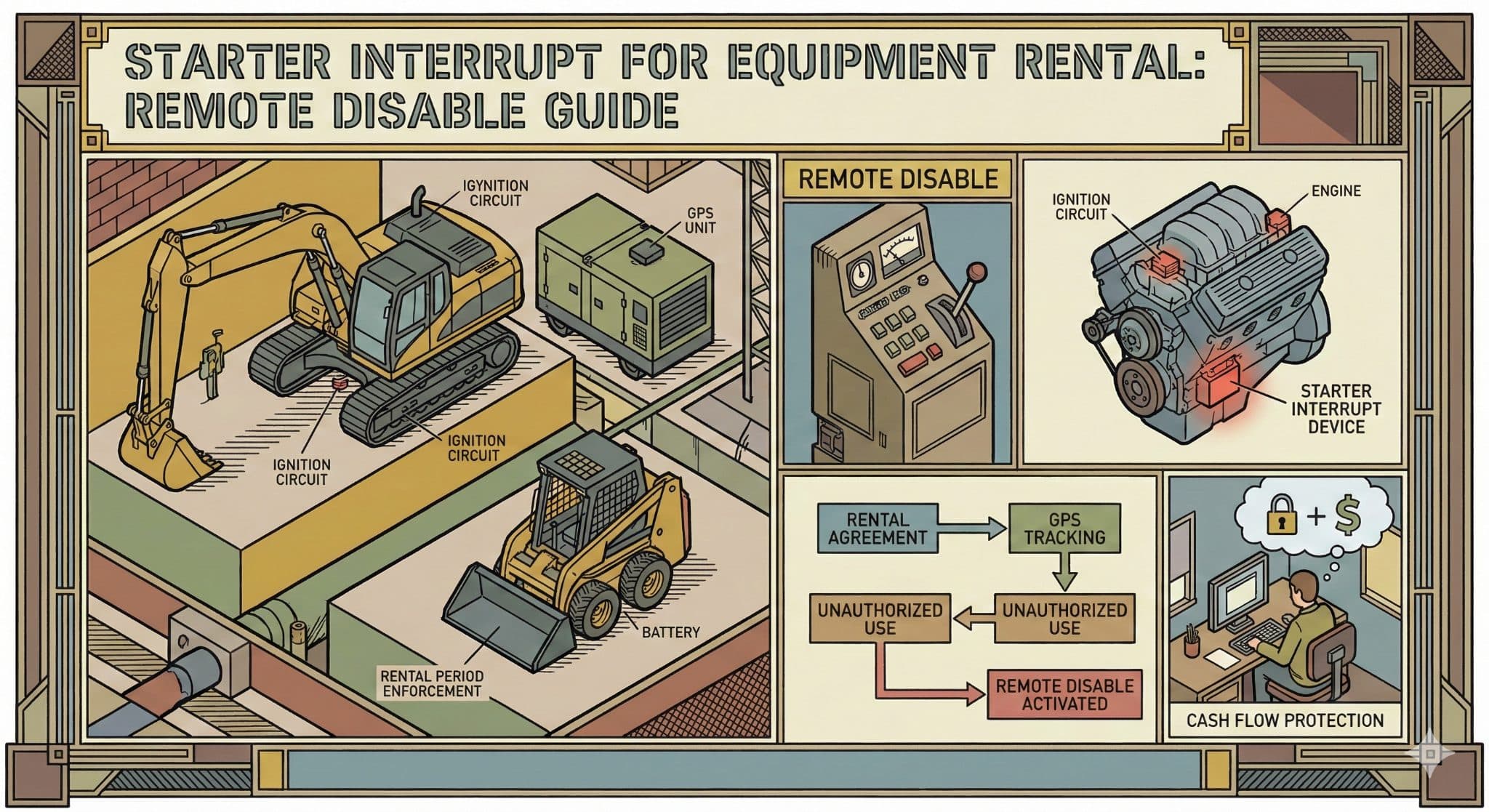Key Takeaways
- AI and machine learning enable predictive and preventative analytics, transforming asset tracking from reactive to proactive management
- GPS asset tracking market is projected to reach $60.7B by 2027, with AI integration driving innovation
- AI-powered systems eliminate manual check-ins and simplify time-consuming asset management tasks like equipment searches
- Advanced anomaly detection creates behavior-based alerts for unauthorized routes, motion patterns, and maintenance issues
- AI integration enables maintenance predictions, route optimization, and enriched digital maps for superior fleet performance
Artificial Intelligence (AI) has reshaped almost every industry in just a few short years. With the GPS asset tracking market set to reach $60.7B by 2027, AI is even taking this fast-growing industry by storm.
Thanks to new Internet of Things (IoT) technology and forward-looking AI capabilities, today's automated tracking systems can do more than just locate assets. In fact, asset managers can now monitor and analyze historical and real-time data to dramatically optimize their operations.
AI for GPS tracking is on its way changing the face of this industry in several ways, let's dive into what this means.
New Trends in Asset Tracking
Simply put, AI-enabled businesses with numerous moving assets can simplify and streamline their operations in exciting new ways.
- AI and machine learning (ML) enable fleet and resource management applications to utilize historical data to conduct predictive and preventative analytics, and enhance operational processes.
- GPS trackers use satellites to track an object's geolocation, and AI takes this process a step further. Asset trackers with AI integration can streamline time-consuming asset management tasks, such as searching for equipment. Discover how fleet benchmarks guide optimization.
- AI and ML enable businesses to identify underutilized assets and eliminate manual check-ins, maximizing utilization and minimizing operational costs. That means businesses can instantly create asset reports, such as inventory and resource management, geofence, movement, inventory, and real-time and historical asset location data.
What is Artificial Intelligence?
Artificial Intelligence refers to systems or machines that mimic human intelligence to perform and optimize tasks based on the data they collect. So what does this mean when it comes to GPS asset tracking?
AI-based GPS tracking solutions can collect raw data and turn it into actionable information and insights that help you make better daily decisions. In other words, software with AI technology enables your devices to make smarter decisions, faster.
Machine learning while often used interchangeably with AI refers to the process of training a computer on a data set. Machine learning is often used to build AI systems.
How is AI Shaping Asset Tracking?
When integrated with GPS tracking software, AI technology allows you to go beyond routine asset monitoring. With AI, you can not only see the location of your objects and receive alerts when the equipment may be faulty, you gain the ability to predict and detect equipment issues where other solutions can only see the raw data.
With an AI-supported asset tracker, you don't have to operate tracking devices manually, and that's just one task it can take off your plate. AI and ML are critical to enabling advanced asset tracking and management capabilities in a number of ways.
6 Ways AI is Reshaping GPS Asset Tracking
1. Data-Powered Insights
Alerts, mileage, moving time, and other metrics recorded by GPS asset trackers can go into an AI model that offers insights to help make more cost- and time-efficient decisions. Managers can use reports and AI-powered recommendations to audit their operations and make real-time changes.
2. Driver Allocation Optimization
AI can calculate the most optimal driver of each route based on historical fuel consumption or driving time. By recommending which driver is best for a specific route, AI enables dispatchers to quickly prioritize driver assignments and save time and revenue.
3. Route Optimization
AI for GPS tracking is essential for optimizing fleet usage. Using AI for GPS tracking allows managers to analyze current road conditions to propose the best and most beneficial routes. Businesses can then use this data to optimize their operations and the time required for assets to reach their destinations and minimize fuel consumption.
Without AI, managers use subpar solutions to choose the best routes for their fleets without the full picture of routes and road conditions, leaving efficiency and savings on the table.
4. Areas of Interest Detection
AI-powered GPS asset trackers uncover patterns in the tracker behavior or the utilization of the asset being tracked –insights that are unknown to the owner, and that can only be found by an intelligent agent that can process large amounts of data and detect smart boundaries.
With this information, these asset trackers can detect popular places based on tracker behavior. Think of this like a heat map. The system can use historical data to cluster high-traffic positions into a geographical area and even route driver boundaries automatically. Learn about geofence alert capabilities for enhanced control.
5. Behavior-Based Anomaly Detection
High-quality AI for GPS tracking can create new alerts based on behavior. For example, if a driver goes from point A to point B, and usually takes the same route, the system can detect as soon as the driver takes a different route and send an alert to notify managers.
Some alerts and notifications that AI can create include:
- Motion start/stop alerts
- Acceleration alerts
- Repeat behavior alerts
- Battery voltage alerts
- Battery disconnected alerts
- Accident alerts
6. Advanced Maintenance Recommendations
AI for GPS also allows managers to predict current and future engine issues. You can then filter vehicle and driver behavior outliers based on historical data. Then, AI can analyze asset behavior and use it to detect anomalies and send you maintenance and repair recommendations. Understand engine hour-based maintenance strategies for optimal equipment health.
7. Enriched digital maps
AI can use publicly available satellite imagery to automatically tag highway details in digital maps, such as lanes, intersections, and traffic lights. This can improve GPS navigation, especially in countries with limited map data. Additionally, AI can update digital maps with real-time information, such as road closures, accidents, construction, and traffic, improving the accuracy and reliability of the maps.
See How Hapn Works for Your Fleet
Harness AI-powered GPS tracking to optimize your fleet and make data-driven decisions.
Get Started TodayHow to Leverage AI-powered GPS Tracking For Your Business
From route optimization to maintenance reminders, GPS tracking AI is changing how businesses manage their assets. Interested in leveraging AI asset tracking for your business? Reach out to our team. We process a tremendous amount of data every hour of the day and are always looking for interesting new ways to use AI to provide more value to our customers. Learn more about top heavy equipment tracking solutions. Please reach out to us here.
——-
Frequently Asked Questions
How does AI improve GPS tracking beyond basic location data?
AI transforms raw location data into predictive insights, anomaly detection, and behavioral analysis. It enables automated maintenance recommendations, route optimization, and intelligent alerts based on pattern recognition rather than simple rule-based triggers.
Can AI tracking detect unauthorized vehicle usage?
Yes. AI-powered systems create behavioral baselines and instantly alert managers when vehicles deviate from normal patterns, including unauthorized routes, unusual time periods, or unexpected locations.
What kind of cost savings can AI tracking deliver?
Businesses typically see 15-30% fuel savings through route optimization, 20-40% reduction in maintenance costs through predictive analytics, and significant theft prevention. ROI is usually achieved within 6-12 months.
How does machine learning improve over time?
ML systems continuously learn from new data, improving anomaly detection accuracy, route recommendations, and maintenance predictions. The longer a system operates, the smarter its recommendations become.
Is AI tracking technology difficult to implement?
No. Modern AI-powered tracking solutions are designed for easy integration into existing operations. Most implementations require minimal setup and training with comprehensive support from solution providers.
Transform Your Fleet with AI-Powered Tracking
Discover the power of intelligent asset management and optimize your operations today.
Start Your Free Trial

